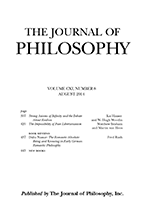History
The journal was founded at Columbia University in 1904 as The Journal of Philosophy, Psychology, and Scientific Methods, under the editorship of Professor Frederick J. E. Woodbridge and Professor James McKeen Cattell. [4] Wendell T. Bush became co-editor of the journal in 1906 and provided it with its endowment. [4] The inaugural issue announced that the journal was founded with the intent of "covering the whole field of scientific philosophy, psychology, ethics, and logic" so that "the relations between philosophy and psychology should remain intimate". [5] In 1921, the name of the journal was shortened to The Journal of Philosophy.
From 1954 to 1985, the President of the journal was Albert G. Redpath. After Redpath's death, Corliss Lamont was President for a short period. Arthur C. Danto was President from 1985 to 2010, followed by Akeel Bilgrami, the current President.
The journal is published from Columbia University. From its founding until 1998, the journal was printed by the Lancaster Press in Lancaster, Pennsylvania. [6] Today, the journal is printed by the Sheridan Press in Hanover, Pennsylvania.
Past contributors to the journal include: Theodor W. Adorno, G.E.M. Anscombe, D. M. Armstrong, A. J. Ayer, Jonathan Bennett, Henri Bergson, Ned Block, Tyler Burge, Rudolf Carnap, Stanley Cavell, David Chalmers, Roderick Chisholm, Noam Chomsky, Paul Churchland, Arthur Danto, Donald Davidson, Daniel Dennett, John Dewey, Fred Dretske, W. E. B. Du Bois, Michael Dummett, Ronald Dworkin, Kit Fine, Jerry Fodor, Harry Frankfurt, Peter Geach, Alvin Goldman, Nelson Goodman, Jürgen Habermas, Ian Hacking, Gilbert Harman, Carl Hempel, Jaakko Hintikka, Frank Jackson, William James, Jaegwon Kim, David Lewis, Walter Kaufmann, Christine Korsgaard, Saul Kripke, Alasdair MacIntyre, J. L. Mackie, John McDowell, George Herbert Mead, Sidney Morgenbesser, Ernest Nagel, Thomas Nagel, Robert Nozick, Martha Nussbaum, Derek Parfit, Charles Sanders Peirce, Alvin Plantinga, Hilary Putnam, W. V. O. Quine, John Rawls, Hans Reichenbach, Richard Rorty, Bertrand Russell, George Santayana, T. M. Scanlon, David Schmidtz, Wilfrid Sellars, Amartya Sen, Elliott Sober, Robert Stalnaker, P. F. Strawson, Charles Taylor, Tim van Gelder, and Peter van Inwagen.
This page is based on this
Wikipedia article Text is available under the
CC BY-SA 4.0 license; additional terms may apply.
Images, videos and audio are available under their respective licenses.




